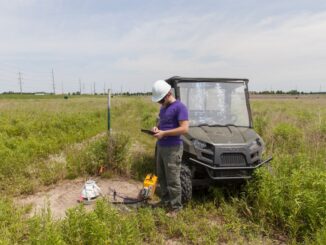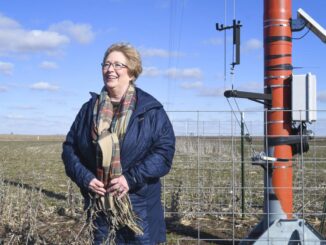
The company seeking to build a controversial carbon dioxide pipeline through five states is offering to pay as much as $19 million for cooperation from an Illinois county that last fall passed a two-year moratorium on such pipelines, according to a draft agreement posted online by pipeline opponents.
A draft agreement that will be discussed at the McDonough County Board Law and Legal Committee meeting on Monday, Feb. 6, appears to be the company’s latest attempt to build the pipeline despite significant opposition from landowners, officials in multiple counties, and the Illinois Farm Bureau.
Navigator has not been able to obtain enough leases for the pipeline’s route across Illinois or for a carbon sequestration site in the state, and on January 20 it withdrew its application for eminent domain powers, after state regulators said the application was incomplete.
The draft agreement with McDonough County offers the county $20,000 per mile of pipeline per year for up to 30 years, with a $630,000 annual cap. The draft says the payment would be contingent on the county acting “in good faith” to “provide positive assistance” to the company, including obtaining road access and rights of way on county land.
Last fall, the county intervened in the eminent domain proceedings before the Illinois Commerce Commission, noting that the pipeline construction could affect emergency responders and farmland. A week later the county passed its pipeline moratorium.
“Navigator will clearly stop at nothing to move forward with its project,” said Central Illinois resident Pam Richart, lead organizer with the Coalition to Stop CO2 Pipelines. “I believe that Navigator is hoping they can make deals with local governments like McDonough County in order to buy them off.”
Sign up for Energy News Weekly
Get the most important energy news of the week delivered directly to your inbox.
McDonough County board member Joe Erlandson said he could not comment, but confirmed the county board will discuss the draft agreement on February 6.
The Illinois Times reported in October that Navigator had made a similar pitch to officials in Montgomery County, offering to pay up to $1.5 million a year for up to 30 years. No agreement has been instated there, but the issue has been on monthly board meeting agendas for the past few months.
Montgomery County resident Karen Sanders said she is furious that Navigator representatives had not met with residents until a contentious forum on January 30, even as they’ve presented to county officials. “We certainly hope they don’t look at the money,” Sanders said of the Montgomery County board.
She said she walked into the recent meeting with Navigator “scared,” and left “terrified, because I felt they were evasive, I felt there was no transparency. I walked out of the meeting having zero confidence in their ability to put in a safe pipeline.”
Navigator did not respond immediately to a request for comment about the draft agreements with counties. In a January 20 press release, Navigator framed the withdrawal of their petition for eminent domain as a positive development, and announced plans to refile.
“To date, Navigator has successfully negotiated with landowners to secure hundreds of miles of pipeline right-of-way easements, thousands of acres of storage pore space, and the necessary well-sites to accommodate the initial injection capacity,” says the release.
“Given the successful progression of permitting and growing commercial commitments, Navigator will be filing a revised permit with the Illinois Commerce Commission before the end of February as a reflection of that expanded scope. With this new permit, Navigator will accelerate the development of additional permanent storage locations across multiple counties in central Illinois, which is a proven home to some of the best geology in the world for carbon sequestration.”
Pipeline opponents are upset Navigator will likely refile with a new proposed route, since they will have to begin anew the lengthy processes of formally intervening in regulatory proceedings, and raising awareness among residents. Opponents in the fall won a legal battle with Navigator to make public the names of people along the proposed route.
Shifting plans
Navigator originally filed a proposal with the Illinois Commerce Commission in July explaining its plan to collect carbon dioxide and sequester it a mile below ground in Christian County, Illinois. It does not need the commerce commission’s approval for sequestration, though it would need EPA and other permits.
As Navigator faced opposition and apparently had difficulty securing enough leases for sequestration “pore space” in Christian County, it added Sangamon and Montgomery counties as possible terminal points for the pipeline, filings with the commerce commission show. In a November 2 filing, Navigator said it had obtained about 50% of the pore space needed for sequestration.
A 2011 Illinois state law regarding carbon dioxide pipelines mandates that regulators must make a decision on applications like Navigator’s request for eminent domain within 11 months of filing, which would mean June 2023. Opponents have argued that Navigator has not revealed enough information about its plans or its impact studies to allow a decision to be made by that date. Under the law, the commerce commission is supposed to consider the pipeline’s possible impact on land, property values, infrastructure and other factors.
In a January 6 filing, commerce commission staff urged the commission to deny the proposal or Navigator to withdraw it. The staff noted that the pipeline’s impact cannot be adequately evaluated since the exact route has not been determined, especially since the endpoint is not yet known. The $3.2 billion, 1,300-mile proposed pipeline would connect to ethanol and fertilizer plants in South Dakota, Nebraska, Minnesota and Iowa before reaching Illinois.
“It’s apparent from Navigator’s recent testimony that its original plans for the project have changed,” says testimony filed January 6 by the Illinois Farm Bureau. “The Farm Bureau is concerned that Navigator is taking a spiderweb approach to developing its pipeline which will lead to additional routing and require subsequent applications to be filed before the commission.”
Local concerns
Sabrina Hamlin Jones said a Navigator representative called her family last summer asking them to lease their land in Montgomery County. She said the offer of “that much money for doing nothing should raise red flags,” and they turned down the deal but didn’t think much about it. Then in December they attended a community meeting hosted by pipeline opponents, and became deeply concerned.
“My husband and I hit the ground running the next day – we ordered yard signs,” and started organizing a series of informational meetings, with experts discussing the risks of carbon dioxide pipelines. “We both have full-time jobs” – her husband with an excavation business, she as a special education administrator – “but this was just something we felt like we had to add to our plate to try to keep our family safe.”
Hamlin Jones said her neighbor across the street has signed a lease for an injection well to sequester carbon dioxide.
“Once the carbon dioxide is pumped into the well, we don’t have control of what happens, it will likely leach under our property and our house,” she said. “My husband and my biggest concern is protecting our children. We are a farm community, everyone here lives off of what we make, our farm, the crops, our animals. The negative impacts it would potentially have on that is really scary.”
Most locals rely on well water, and while carbon dioxide in water is harmless, she worries about chemical reactions that could happen in the limestone formation below ground.
“Where we live well water is the only water we have – we don’t have anything else to utilize if our well water is tampered with,” Hamlin Jones said.
She fully expects the company to refile a new proposal, as residents are just “waiting for the other shoe to drop.” She and other residents said they feel like company officials are now targeting landowners who don’t live in the area, rather than locals, to try to get them to sign leases.
“We really feel they came into Montgomery County and invaded quietly,” said Sanders, a vice president of advancement at a community college. She added that she worries about a pipeline rupture and with an all-volunteer emergency medical services team, “we would not be prepared to handle any type of catastrophic event in our area. That’s very frightening to me.”
Dubious benefits?
In September, Mark Maple, the Illinois Commerce Commission’s Senior Gas Engineer in the Energy Engineering Program of the Safety & Reliability Division, testified that Navigator’s proposal did not meet state standards for granting eminent domain. Among other things, the state law meant to facilitate carbon dioxide pipelines expressly states that such pipelines are in the public benefit since they help grow Illinois’s “clean coal” industry, he noted. The law was passed to facilitate the planned zero-emissions FutureGen coal plant, which was never constructed.
But Navigator’s pipeline would collect carbon dioxide primarily from ethanol plants, not coal plants.
“Without a sequestration facility in place and the end point being uncertain, the entire route remains in flux, and consequently, in my opinion, it is not a benefit to the citizens of Illinois nor in the public interest,” Maple testified. “In my opinion, NHG’s proposed pipeline does not match the legislative purpose of the CO2 Act, which sought to promote and use Illinois coal.”
Maple noted that Navigator would also need 14 separate federal, state and local permits for the project, and as of September the company had none of them, and likely could not obtain them before the June 2023 deadline for the commerce commission to rule on the eminent domain proposal.
A citizens group intervening in the proceeding blasted Navigator for refusing to produce standard information including a report on geohazards, with the company arguing such information was not required or had not been completed.
The citizens also called “meaningless” Navigator’s statement that it would confirm to or exceed federal PHMSA pipeline standards, since, the group testified, PHMSA does not have relevant standards for carbon dioxide pipelines.
The federal Inflation Reduction Act has offered generous 45Q section tax credits for carbon dioxide sequestration, fueling a rush to transport and sequester carbon dioxide even as there are few federal or state safeguards in place, critics argue.
“It’s like the Wild Wild West out there, with all this federal funding,” said Richart. “It’s hard to detect what they’re doing, how many projects they’re doing, and who they’re working with. The landowners are really feeling they are being left in the lurch.”



